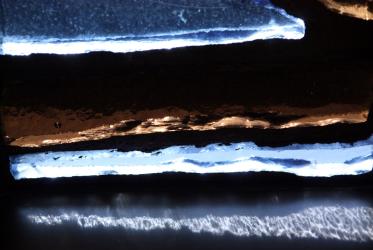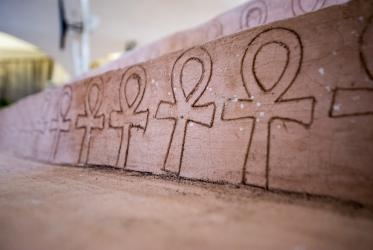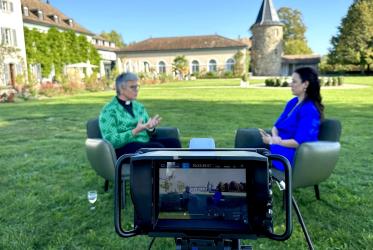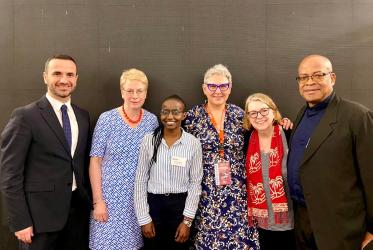The Dutch Reformed Church (DRC) in South Africa is currently striving to revive and enhance its missional identity with its core aspect being a church for Africa, said DRC general secretary Dr Gustav Claassen.
He spoke at a meeting of the World Council of Churches (WCC) Commission on Faith and Order, held 15-22 June near Pretoria in South Africa and hosted by the DRC (in Afrikaans Nederduitse Gereformeerde Kerk, or NGK).
“As the church also celebrates 500 years since the Reformation, the DRC also deliberately works towards the rediscovery and enhancement of its Reformed identity in the context of modern-day southern Africa,” said Claassen.
“It would like to be a church in Africa and for Africa, embracing diversity in the unity of the body of Christ,” he said.
“After more than 350 years of existence, the DRC still confesses to be a Reformed church that adheres to the authority of scripture and that is missional in character in its Southern African context.”
The meeting of the commission this year held a special significance. The DRC left the WCC in 1961 due to criticism for its role in supporting South Africa’s apartheid policy, rejoined the WCC in 2016 and, this year, is hosting the Faith and Order meeting.
The commission is considered one of the most ecumenical bodies of the WCC with official representatives of churches belonging to the main historical streams of Christianity, including the Roman Catholic Church. It is a multilateral, global forum of ecumenical theology.
Striving for inclusion
During the apartheid era, the DRC had been criticised as it supported the racist policies of the governing National Party, driving out pastors who questioned that role such as Beyers Naudé who succeeded Archbishop Desmond Tutu as secretary general of the South African Council of Churches in 1985.
Another pastor who turned his back on the white DRC was Nico Smith who chose to serve a congregation and live in Mamelodi, a black suburb in Pretoria during troubled times in 1985.
Claassen explained, however, “From the late 1980s and early 1990s, and especially after the DRC confessed that its theological justification of and practical collaboration with the apartheid system was a sin, the drive to reunite at least the domestic churches has increased.
“However, the DRC continues to express its sincere eagerness to work towards greater visible unity, not only with the domestic sister churches, but also within the broader family,” he said.
In traditional white congregations, the use of Afrikaans as the language used in the church might make it less appealing for the black community who speak other languages to join. Yet many members of mixed-race communities have no difficulty slotting in.
“The DRC also continues to strive to establish close partnerships and develop warm relationships as a step on the way of realising the ideal of unity,” Claassen said.
“Apart from the many facets of DRC activities inside congregations, the DRC also tries to serve communities more broadly through community development programmes.”
The DRC general secretary explained how the DRC is the oldest church in the family of Reformed churches and, in the past, it was referred to as the “mother church”.
First Dutch in the Cape
The first Dutch settlers who arrived at the Cape in 1652 also brought a Reformed church with them, hence the name.
“Another distinct influence on the church was effected by the number of Scottish ministers arriving at the Cape from 1818. Especially the descendants of Rev. Andrew Murray who arrived in 1820, had a marked effect on the church,” noted Claassen.
He spoke of the broader DRC family including Dutch Reformed Church in Africa (DRCA), the Uniting Reformed Church in Southern Africa (URCSA) and the Reformed Church in Africa (RCA).
It also includes different churches in, for example, Botswana, Malawi, Zimbabwe, Zambia, Mozambique, Kenya, Nigeria, Namibia, Swaziland and Lesotho.
“It is, however, not possible, neither financially nor practically, that all the missionary activities and the facilities discussed above could be maintained by the ‘mother church’,” Claassen said.
After the British arrived in South Africa during the Great Trek that started in 1836, a large part of the white population moved into the interior of Southern Africa to settle in the regions that later became the Orange Free State, Natal and the Transvaal.
Many new congregations were established and the need for qualified ministers increased. This led to the establishment of the first theological seminary in 1859 in Stellenbosch. In 1917 a second training institution for ministers, the Faculty of Theology at the University of Pretoria, was established.
The third institution, the Faculty of Theology at the University of the Orange Free State (now the University of the Free State), was established in 1978.
During the apartheid era those universities for the most part only admitted white students, but they are now fully open institutions.
A colloquium took place on 16 June at the Faculty of Theology of the University of Pretoria, celebrating its 100th anniversary, and it has transformed from the apartheid days to now being an open and diverse institution with more than 60 percent black students, many from other African countries. The faculty is also engaged in interfaith work.





